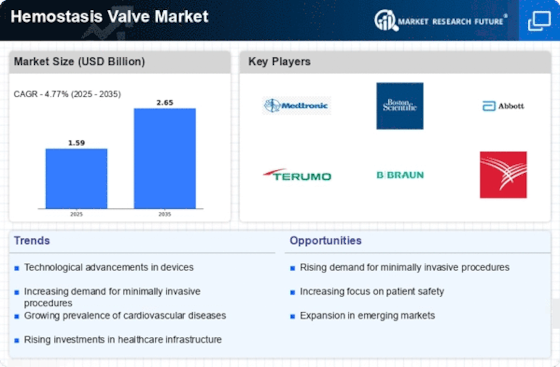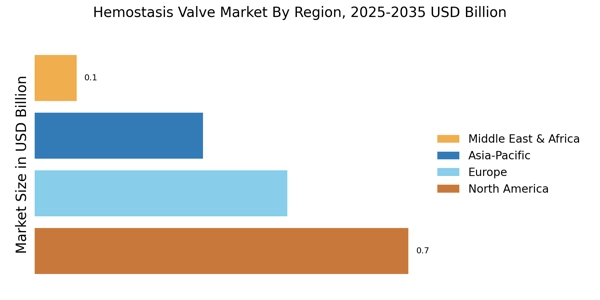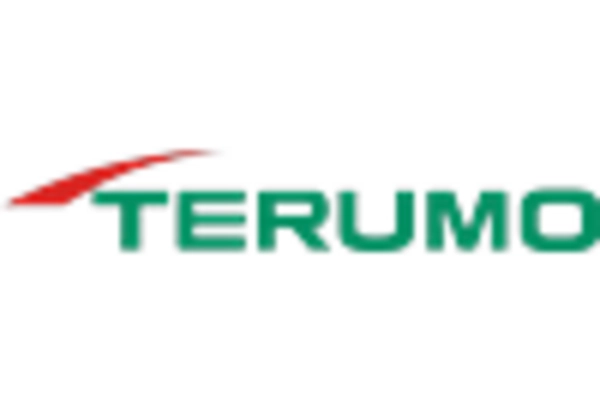Regulatory Support and Quality Standards
The establishment of stringent regulatory frameworks and quality standards is shaping the Hemostasis Valve Market. Regulatory bodies are increasingly emphasizing the need for high-quality medical devices, which has led to enhanced safety and efficacy of hemostasis valves. Compliance with these regulations not only ensures patient safety but also fosters trust among healthcare providers and patients. As manufacturers strive to meet these standards, the market is likely to see a rise in the availability of advanced hemostasis valves that adhere to international quality benchmarks. This regulatory support is expected to drive market growth, as healthcare facilities prioritize the procurement of reliable and compliant medical devices to improve surgical outcomes.
Technological Innovations in Valve Design
Technological advancements in the design and functionality of hemostasis valves are significantly influencing the Hemostasis Valve Market. Innovations such as the development of biocompatible materials and improved valve mechanisms enhance the performance and reliability of these devices. For instance, the introduction of smart hemostasis valves equipped with sensors for real-time monitoring is gaining traction. These advancements not only improve surgical outcomes but also reduce the risk of complications, thereby increasing the adoption of hemostasis valves in various surgical procedures. The market is expected to witness substantial growth as manufacturers invest in research and development to create next-generation hemostasis valves that cater to the evolving needs of healthcare professionals and patients alike.
Rising Incidence of Cardiovascular Diseases
The increasing prevalence of cardiovascular diseases is a primary driver for the Hemostasis Valve Market. As heart-related ailments continue to rise, the demand for surgical interventions, including valve replacements and repairs, escalates. According to recent data, cardiovascular diseases account for a significant portion of global mortality rates, necessitating advanced medical solutions. Hemostasis valves play a crucial role in these procedures by ensuring effective blood management during surgeries. The market for hemostasis valves is projected to grow as healthcare providers seek to enhance patient outcomes and reduce complications associated with surgical interventions. This trend indicates a robust growth trajectory for the Hemostasis Valve Market, as innovations in valve technology continue to emerge to meet the needs of an aging population and the increasing burden of cardiovascular conditions.
Aging Population and Increased Surgical Procedures
The aging population is a critical factor driving the Hemostasis Valve Market. As individuals age, the likelihood of requiring surgical interventions increases, particularly for conditions related to cardiovascular health and orthopedic issues. This demographic shift is leading to a higher volume of surgeries, thereby escalating the demand for hemostasis valves. Market analysis indicates that the number of surgical procedures is expected to rise significantly in the coming years, driven by the need for effective blood management during operations. Consequently, the hemostasis valve market is poised for growth, as healthcare providers seek to equip themselves with advanced solutions that cater to the needs of an aging patient population.
Increasing Demand for Minimally Invasive Surgeries
The growing preference for minimally invasive surgical techniques is a significant driver for the Hemostasis Valve Market. These procedures offer numerous advantages, including reduced recovery times, lower risk of infection, and minimal scarring. As surgeons increasingly adopt these techniques, the need for effective hemostasis management becomes paramount. Hemostasis valves are essential in controlling blood flow during minimally invasive surgeries, ensuring patient safety and optimal surgical outcomes. Market data suggests that the minimally invasive surgery segment is expanding rapidly, with a projected growth rate that outpaces traditional surgical methods. This trend is likely to propel the demand for hemostasis valves, as healthcare providers seek to enhance the efficiency and effectiveness of their surgical practices.

















